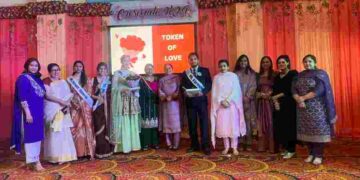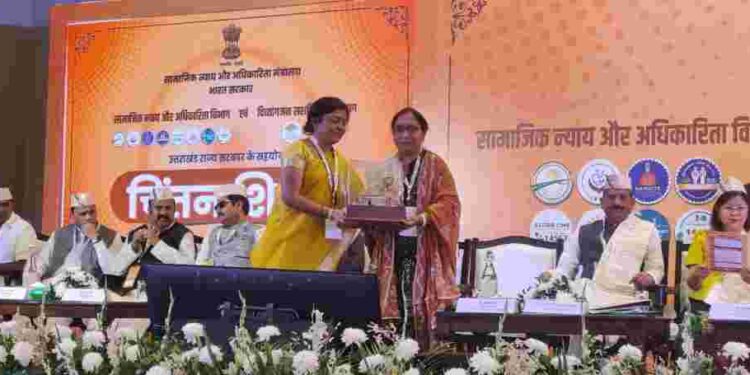“Under the leadership of CM S. Bhagwant Singh Mann, the Punjab Government is fully committed to the welfare of Scheduled Castes and Backward Classes”
“Rights must reach those in need” – Dr. Baljit Kaur emphasizes need for transparent monitoring of welfare schemes
Chandigarh, April 10:
Punjab Cabinet Minister for Social Justice, Empowerment and Minorities, Dr. Baljit Kaur represented the state at the National Chintan Shivir organized by the Ministry of Social Justice and Empowerment, Government of India, held in Dehradun. Strongly voicing key issues concerning the welfare of Scheduled Castes (SC), Backward Classes, and Minorities, she made a robust case for Punjab’s concerns before the Central Government.
Praising the initiative, Dr. Baljit Kaur stated that platforms like these provide states with valuable opportunities to share the challenges and policy-level hurdles encountered while implementing welfare schemes. She affirmed that the Punjab Government, under the leadership of Chief Minister S. Bhagwant Singh Mann, is fully dedicated to the inclusive development of marginalized and underprivileged sections of society.
Dr. Baljit Kaur said, “Being the state with the highest Scheduled Caste population in the country, it is our moral responsibility to ensure their welfare through focused interventions.” She added that both Centrally Sponsored Schemes and State-run initiatives are being effectively implemented in Punjab with significant impact.
Key Issues Raised by Punjab at the Chintan Shivir:
Demand for Reforms in Scholarship Schemes:
Dr. Kaur called for revising the current income ceiling of ₹2.5 lakh for scholarship eligibility, terming it outdated in the present economic context. She urged that raising the income limit would enable more deserving students to avail the benefits. Highlighting delays in central disbursal, she pointed out that funds for the years 2017 to 2020 are still pending, causing hardships for both students and educational institutions. She appealed to the Central Government to release the pending amount at the earliest.
She also demanded an increase in scholarship amounts for students belonging to Other Backward Classes (OBC), Economically Backward Classes (EBC), and De-notified Tribes (DNT), considering their growing educational needs. Dr. Kaur stressed the importance of covering the full course and tuition fee gap to ensure uninterrupted education for underprivileged students.
Demand for Timely Funding under the Adarsh Gram Yojana:
She informed that Punjab had identified 3,293 villages under the Adarsh Gram Yojana due to its large SC population, for which ₹684 crore was sanctioned. However, only ₹101 crore has been released so far. She urged the Central Government to release the remaining funds swiftly to enhance rural infrastructure.
Additionally, she recommended increasing the per-village grant from ₹20 lakh to ₹1 crore to ensure timely and quality development works.
Need for Transparency and Monitoring in Housing Schemes:
Appreciating the benefits of the housing scheme for the SC and economically weaker sections, Dr. Kaur raised concerns regarding a lack of transparency at the panchayat level in beneficiary selection. She demanded that the responsibility for identifying eligible beneficiaries and monitoring the scheme be assigned to the Department of Social Justice to ensure fair and effective implementation.
Punjab’s Own Schemes and Unique Initiatives:
Dr. Kaur highlighted various welfare schemes being run by the Punjab Government. Under the “Ashirwad Scheme”, a financial assistance of ₹51,000 is provided for the marriage of daughters from SC, BC, and EWS families, limited to two girls per family. This initiative, she said, plays a crucial role in strengthening the socio-economic security of families.
Talking about recent progressive steps, Dr. Kaur mentioned that the Punjab Government has waived loans worth ₹70 crore availed by SC beneficiaries, benefiting over 5,000 individuals and offering them a fresh start in life.
She further shared that Punjab has become the first state in the country to introduce sign language interpretation for live telecast of Assembly proceedings—an innovative step towards inclusivity for persons with hearing and speech impairments.
Commending the state-led “Project Jeevan Jot” launched in 2024, Dr. Kaur informed that 268 child beggars have been rescued and rehabilitated. Out of these, 19 children are currently placed in government-run homes with access to free education, nutrition, and healthcare, while the remaining have been reunited with their families through Child Welfare Committees.
Concluding the session, Dr. Baljit Kaur said:
“This Chintan Shivir has provided us with a pathway toward collaborative progress and shared vision. The Punjab Government remains committed to ensuring that the benefits of welfare schemes reach every underprivileged, marginalized, and needy individual.”








